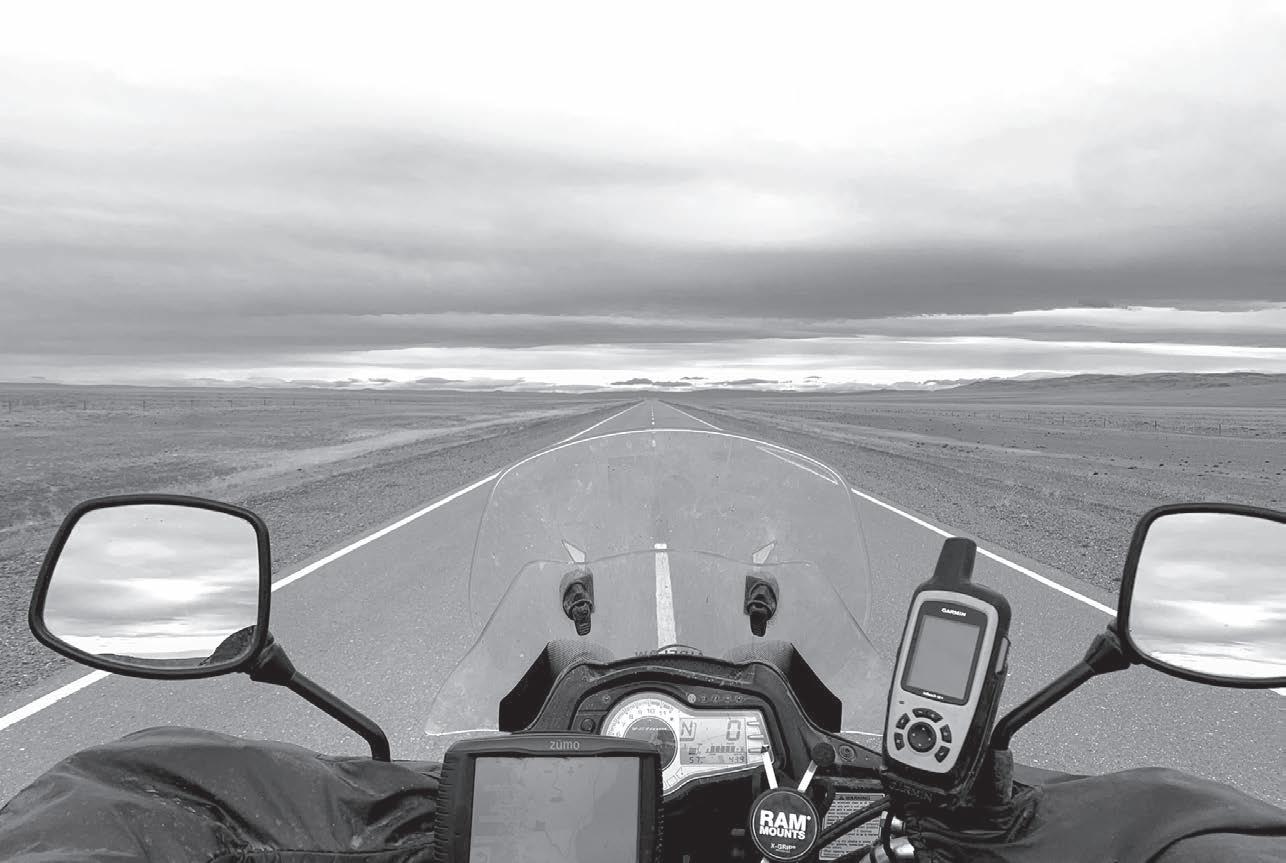
19 minute read
PORTRAITS OF GENERATION Z

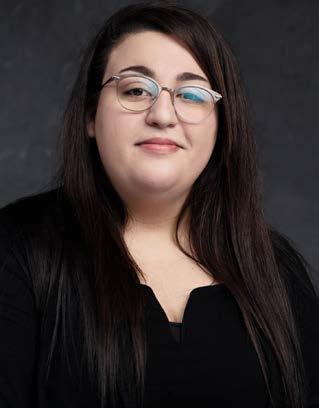
Advertisement





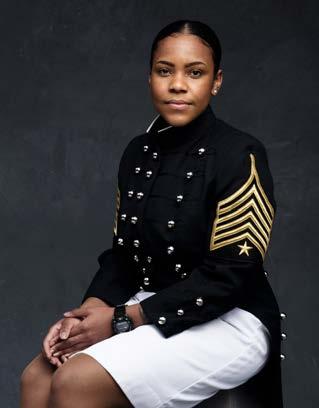
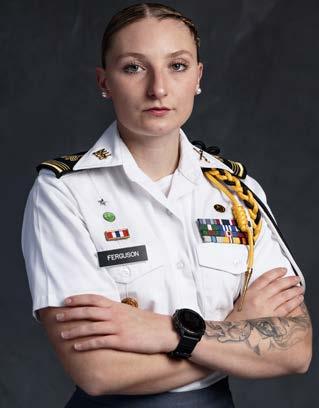

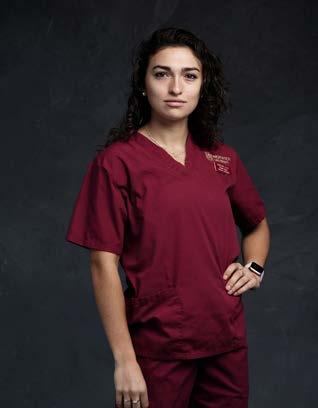



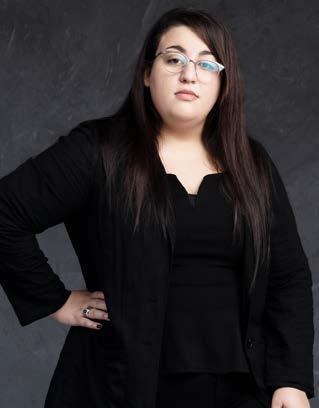

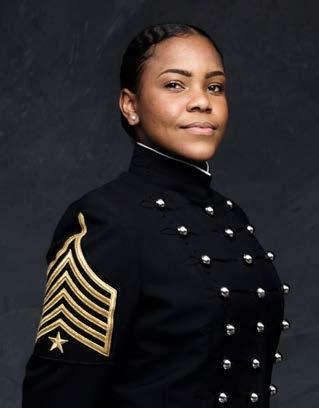


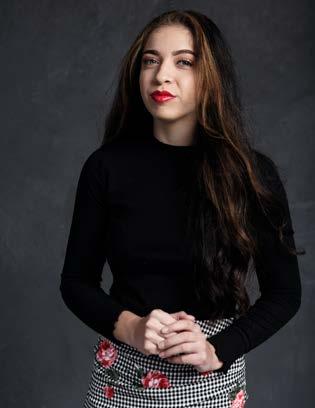
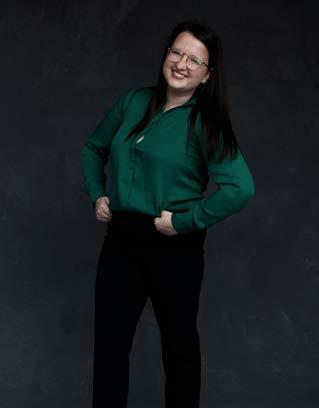
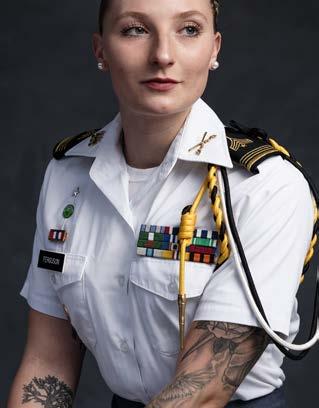
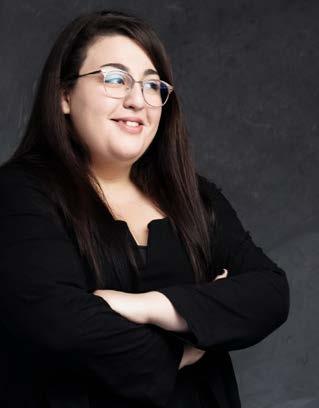

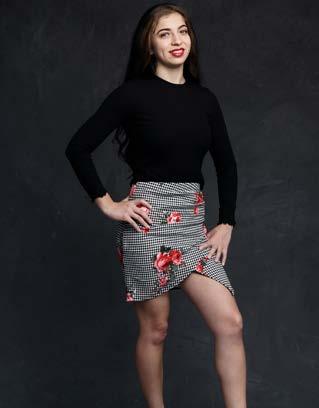

NU undergraduates talk about their role models, career plans, special superpowers, and reimagining the status quo

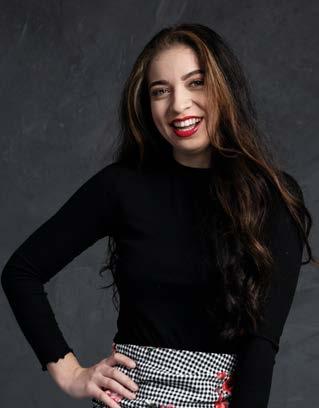

INTERVIEWS BY SEAN MARKEY PHOTOGRAPHS BY ROB STRONG
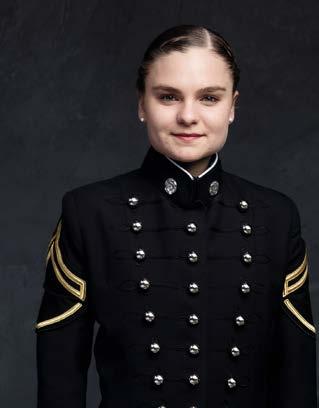
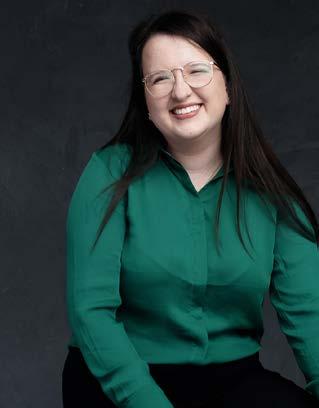

Shawnae Evans ’21 Neuroscience major | Fort Lauderdale, Florida
We’re embracing equality as a Seeing her work with them, the care for nation now, and I think it’s her patients, and her altruism, really resan important topic to talk onated with me when I was younger. I about. Those of us in Generation Z are pursued a more academic route, but both more open to talking about things of my parents played a huge role in pushing that nature and getting to the bottom me to see my potential. Also, the surgeon of these issues. I think that’s something I shadowed over the summer. Her name that older generations have a harder is Dr. Keyne Johnson. She’s a neurosurtime dealing with. geon at the Brain and Spine Institute for
Women today are open-minded but Children in Orlando, Fla. She works with strong. We’re go-getters, and we know many patients, but most of them are chilexactly what we want. We’ve seen our dren with traumatic experiences or who grandparents, our mothers, and others sometimes need long-term treatments. I grow up in ages where they didn’t have the love how reassuring she is as a doctor to same opportunities. Today, we’re moving both her patients and their family memaway from that. It’s completely okay, by bers. It’s becoming increasingly hard to the way, if women want to stay home and find doctors who are truly invested in raise kids. But at the same time, I’m seeing their patients and believe in patient-cena lot of people stray away from that. We tered care. I think it’s important to be a want education, and we want to feel like holistic doctor and not just account for we’re making a difference in the world. I the patient’s diagnosis, the same way I want to make a difference in the world. believe in being a well-rounded person. I’m aiming for medical school right after My superpower? God-given resilience. I commission, which would be phenome- It’s a trait that I pride myself in. No matter nal. It’s an unusual track for an Air Force what the situation is, no matter how bad ROTC student, so it’s been a challenge. things get, I always see it through. Noth-
I have many role models—first and ing makes me happier than hearing those foremost, my mom. I think she’s the stron- that come after me tell me they wanted to gest person in the world. She is someone throw in the towel, but they keep going who has influenced my life in terms of my because I kept going. I’m always honest future career in medicine. She is a home in my response. The only reason I keep health aide for elderly hospice patients. going is so we could all make it, together.

Air Force ROTC scholar Shawnae Evans is the executive officer of the NU Corps of Cadets and a tabholder of the NUCC Drill Team. A distinguished undergraduate research scholar, she serves as a member of Student Government, the vice president of the Tri-Beta Biology Honors Society, co-president of the Neuroscience Club, and was recently awarded an Air Force scholarship to attend medical school.
Haley Bechard ’22 Nursing major | St. Albans, Vermont
Women today are leaders. Especially on this campus today, I feel there are so many women here that are coming out of their shell and stepping into a leadership role. I serve in many myself, most recently as the student orientation coordinator this past year, which was a huge responsibility. I worked with incoming freshmen and new transfer students. I learned a lot about myself. I learned a lot about connecting with others from different backgrounds. I’ve also been involved in a lot of Board of Trustees meetings and now the Civilian Junior Ring Committee. I am the co-chair this year. I was just so fascinated by the ring. It is such a big deal here, and I really wanted to be on that committee. I don’t regret it a day. I’m super happy. It’s a really good design. It’s great to get civilian students—both commuter and residential students—involved and passionate about our class ring.
This year I’m a junior leader in the Center for Civic Engagement’s Civic Scholars program, which is a four-year program for volunteerism. By the end of the four years, you have served 500 hours of community service. I’ve had quite a few different community service roles.
“Women are stepping up and taking the spotlight.”
I’ve been at People’s Health and Wellness, which is a non-for-profit clinic in Barre, Vt. I’ve done a lot of volunteer work there. I was with a nurse, and I shadowed her for a period of time. We went through basic intake of a patient, and evaluating the patient’s concerns, chatting with them, seeing what we could offer, and kind of providing them with community resources. I also volunteer with the blood drives on campus, and now I help with NU’s COVID testing every single week.
I definitely don’t feel that there is a level playing field for women, but I think that we’re working towards it. I see changes happening within politics and our world today. I hope, as I go out into the workforce, that that changes and we become more equal.
I know this sounds like a very basic answer, but my role models were definitely my parents. I grew up on a farm in kind of the middle of nowhere in Vermont. I definitely acquired a work ethic and perseverance at a very young age. I take those skills here.
My superpower? I wish I had a couple of superpowers. Can we go with that? But let’s say, I’m very focused and very driven in my goals. From a very young age, I’ve known what I want in life, and I won’t stop until I get it.
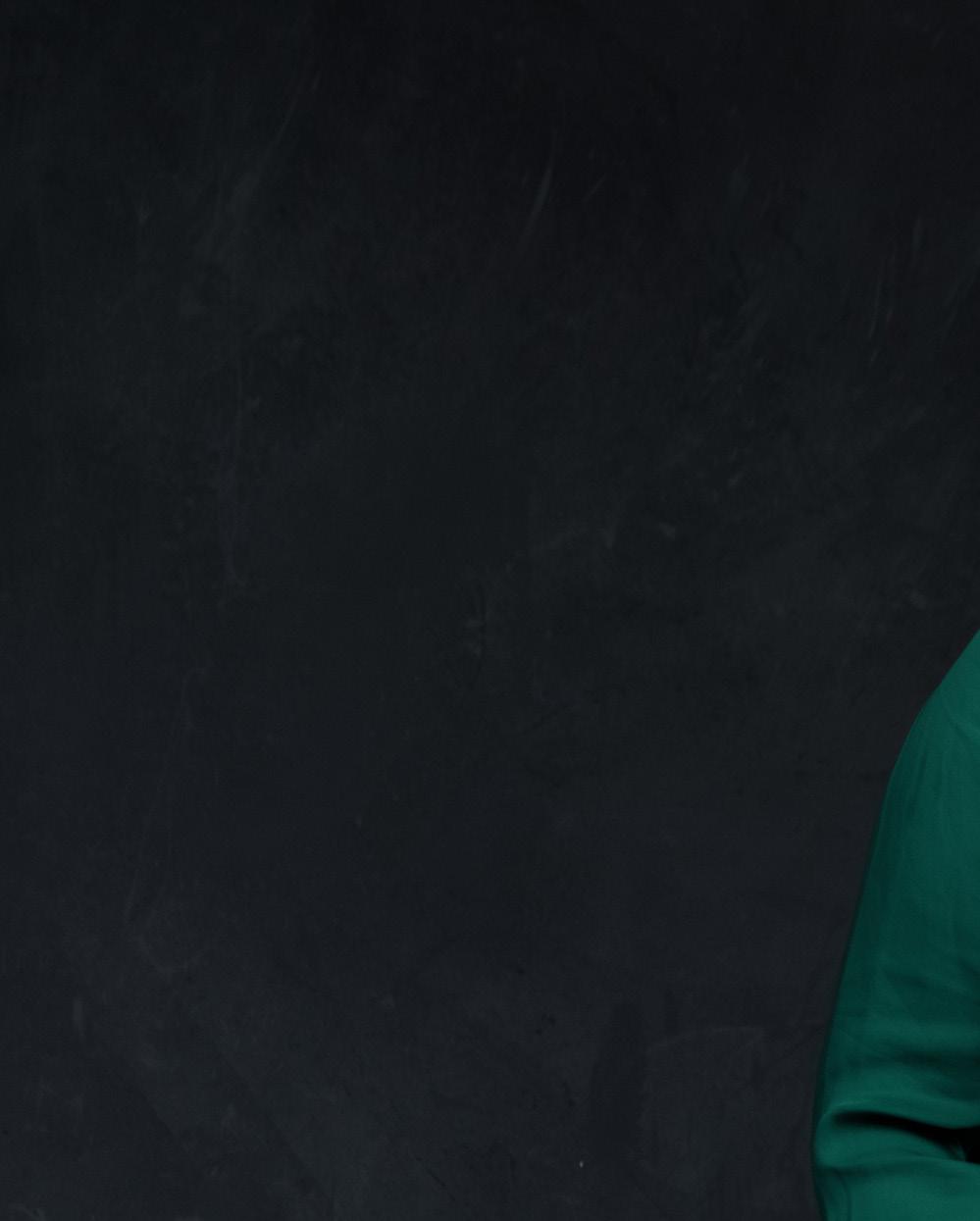
Haley Bechard became a Licensed Nursing Assistant in high school and has worked at Northwestern Medical Center for the past three years, serving in surgical, ICU, and emergency settings. The job’s skills and life experiences have “shaped me into the leader I am today,” she says.


Rebecca Garcia ’21 Psychology major | New Mexico
Ifeel there’s a lot more support for women in leadership and leadership roles. But if I’m going to be honest, it’s still difficult. But I see women coming together and helping support other women. That kind of creates a whole environment for others to join in, like men or non-binary people. Everyone just empowers women, and we empower each other. When I was younger, I felt we were all against each other. We were kind of competing, because there were not many women in the military or at least not during training where I was five years ago. And so it was kind of like a competition, “Well, I’m going to do this better.”
But now I see the women I work with. We’re lifting each other up, and we have each other’s back. I’ve witnessed that in civilian jobs and social circles, as well.
What is my superpower? Maybe my superpower is being humble. Because I’ve been asked this before, and I really couldn’t think of anything. Someone pointed out to me that being humble is a power in itself, because I help anyone regardless of what the situation is.
I want to be in the National Guard, and I want my civilian full-time jobs to be in social work, because I had a lot of experiences with social workers growing up. In high school, I did a mentorship program and I worked with occupational therapists and also social workers. I really like that field. I want to be in social work, because I just want to help children. A lot of people tell me that I have the personality to pursue that career, because it’s one of those careers that not everybody can do. It’s really a heavy job.
I come from a rough background myself. Most of the experiences I had with social workers were when I was growing up. They really helped me, and my family. I really appreciate them. They really made an impact on our life. We’re doing better now, and I want to be that person in many people’s lives, as well.

Rebecca Garcia is bilingual and a residence advisor and Army ROTC cadet, who serves as the officer in charge for 2nd Lieutenants in the NU Army ROTC program. She enlisted during high school and transferred to Norwich as a junior after attending a two-year military junior college in New Mexico.
Olivia Giarrizzo ’21 History major | Tampa Bay, Florida
My superpower? Perseverance. I’m 4'10", 95 pounds, and I’m a Marine now. I feel like everyone has a demon in their life. It can be physical, mental, an outside source. But for me, it’s always been my size. I’ve really, really struggled in the past couple of years, sort of trying to work with it instead of against it. I feel my superpower could be both resilience and perseverance, because the day I realized that my height and my weight was my advantage, not my disadvantage, it changed everything for me. It helped me persevere through, I think, one of the hardest times in my life—junior year here at Norwich. I was really struggling with the physical aspects of being a Marine, because I’m so tiny. But I had to make it my friend and really persevere through it. Because I knew that if I didn’t, I’d never earn the title of United States Marine. And I didn’t really know how to live with myself with the thought of that. So definitely perseverance. My career hasn’t even started, so I just have to continue using that as my superpower.
What have I learned about leadership? Leadership is mutual. Give to others as a leader what you would expect them to give to you. I just call it being a human. That’s it to me. That’s what leadership is. Being a human taking care of people, giving them guidance, mentoring them.
I think it’s our job as Generation Z to do our best to educate others to see that the world is changing and that it’s not necessarily for the worse. I think one way that we as women can help that, is not giving others a reason to doubt our abilities as women. I think we’re so quick to say, “Oh yeah, you’re right, we can’t do that. It’s not possible for a woman to be President. It’s never happened, so it’s not going to happen.” But that’s giving away our power.

Olivia Giarrizzo is a Navy ROTC Marine Corps Option scholarship recipient and a member of the NU Corps of Cadets. After graduation, she plans to commission into the Marines and serve as a second lieutenant strategic communication officer.


Caroline Ells ’20 Accelerated nursing program major | Barnstable, Massachusetts
My dad went to Norwich. He that has all of these things that they want graduated in ’84. I believe to do. But at the same time, we can’t. It’s he only had four women that like we’re kind of missing that one step. graduated in his class with him. I be- The differences in every single woman lieve it’s a 4:1 ratio for men to women are remarkable. I admire women for evright now. Norwich is progressing with our generation, also the empowerment of the generations before. Norwich has really taken hold of what’s going on in the world, and I feel like I’ve been given every opportunity coming here to succeed. erything that they are capable of doing. I admire my two twin little sisters (their names are Lucie and Lillie) and the way that they have been brought up within their generation versus my own. They’re 16. They’re in high school. With everything in the world that’s been going on, it’s so interesting to see how progressive they
From my standpoint, going into a new are. I really admire them for the stance career, there’re still so many limitations. that they are able to take and the opporWomen still have that pay gap. There are tunities that they have. It’s empowering not as many leadership roles available as to see that in a 16-year-old girl. there should be, and that’s for all genders. Women today are better off than they As a young woman, I see that there are a lot were 10 years ago, 20 years ago, 30 years of barriers, especially with my generation. ago. I think the important thing for womI’m going into this new field, but at the en today to recognize is that sometimes same time, I’m still going through college we have to take five steps backwards to and I can’t afford to really live on my own. take that one giant leap forward. To conI’m dependent still on my parents. So you tinue to be progressive and to be outspoare seeing this generation that is thriving ken and to empower one another is what with independence, that is progressive, is going to help us succeed in the future.

Caroline Ells graduates in December from the School of Nursing’s 18-month accelerated nursing program and recently accepted a position as an inpatient surgical nurse at Dartmouth-Hitchcock Medical Center. One of five siblings, her older sister Elizabeth ’18 and younger brother Ted ’24 are also NU legacy students.
Cheyenne Khoury ’21 Civilian criminal justice major, English minor | Glendale, Arizona
I’m working in the Center for Civic into. That took a lot of trial and error. I Engagement as the student com- think that was my main takeaway from munity outreach coordinator. This Norwich—there is no perfect equation for fall, I was an orientation leader. I’m also leadership. You kind of develop as you go. the liaison between student volunteers Who are my role models? My really and the Bridges afterschool program dear friend, Molly Alfond ’20. She really in Northfield and a board member and paved the way for me here at Norwich. She costume coordinator for the Pegasus showed me what a strong woman is and Players. I’m also assisting as the student how to overcome adversity. She’s someone leader for the university’s COVID-19 that I go to even now. And as cheesy as it testing site. Why does that work appeal to me? sounds, probably my mother. She’s Lebanese, and she immigrated here when she Honestly, as corny as it sounds, I’ve al- was 13 with her family. She has a lot of ways loved the idea of helping someone health issues. Having seen her overcome who needs it. Especially working with all of that drives me to do better. children, which is usually my primary My outlook? I feel like women have volunteer sites. I usually do theater with come a long way from even 20 years ago. the local students here or music or any- There’s still a lot of work to be done, but thing arts-related, sort of to help with I feel like we’re doing a good job as far as self-expression and day-to-day stuff. I’ve women and power goes. I think we’re on always liked the idea of being somebody the right track. We still have challenges, who I wish I had when I was growing up. but I think we’re doing okay. We’re really That’s really what drives me to do a lot of starting to see more women in power, espevolunteer work. cially at the school. We have a lot of women
I’ve learned there’s no perfect style role models and women leaders here. of leadership. Over my four years here, My superpower? Probably being able I’ve always believed in giving it my all to quote every single episode of Supernatand really caring for your subordinates. ural. That’s 15 seasons worth, so that’s a That’s kind of what my style has developed pretty cool superpower.

Cheyenne Khoury’s father was born in Bulgaria, her mother in Lebanon. She plans to pursue a career in law enforcement after graduation and aspires to one day work for the F.B.I.
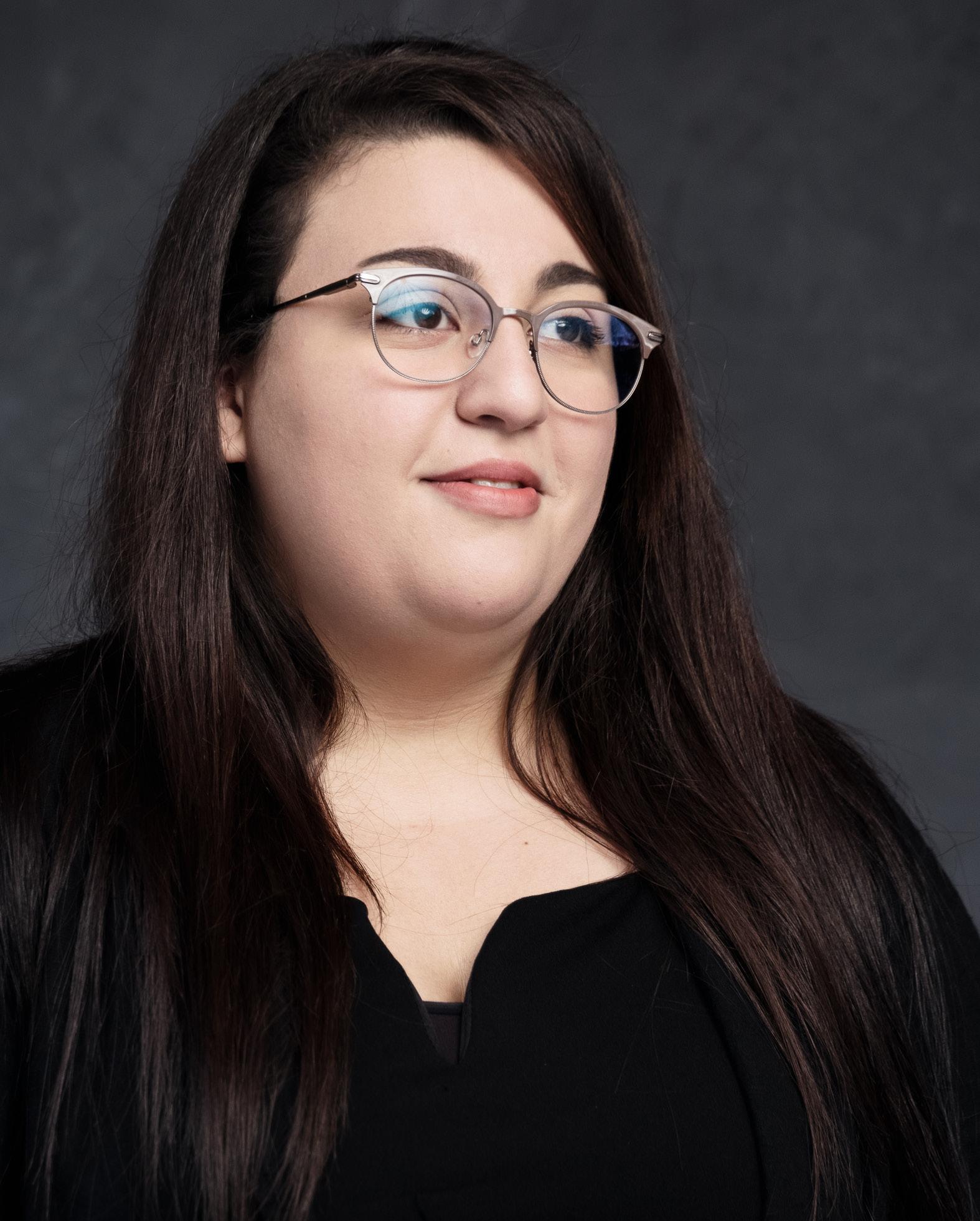
Fergie Ferguson ’21 Criminal justice major, political science minor | Middletown, Delaware
Because we have the ability to do without your consent. You’re not defined it, most women today break re- by anything you go through, rather how cords and norms constantly. Yet you come out of it. that does not mean we are respected for One of the best things about Norwich it. Sometimes it is hard to be confident is how leadership roles for females can when there are people who completely disregard you. The hardest truth sometimes is trusting your instincts. In my experience, some guys are stuck in the idea that women just are not as capable as men. I feel my father did a good job raising me to be hard working. I always put myself in positions to grow and not think so much about who wants me to be there. At Norwich, I learned who the best version of myself is and how I can support her. I switch between grades and ranks with the males. Right now, I’m going out for Mountain Cold Weather company, and my rook is in a leadership role. At one time I taught him, and now he is teaching me. As a leader trust and respect are vital. The loyalty you gain from your subordinates and your peers is unique. You learn what you want to do better as a person. You set expectations for how you interact with people and what you expect of them in return. My mom inspires me. She runs her know who I am meant to be now and that own business and she’s always charisit can be a forever work-in-progress. I matic and upbeat. She has shown me that initially came here wanting to be an Air strength exists on various physical and Force lawyer. Today, I am a few months emotional levels. That working with peoaway from graduation, and I am pursuing ple is a struggle. But by being secure in a commission as an infantry officer in yourself, you will never be at a disadvanthe Army. tage by needing anything from anyone.
My superpower would be my drive The key is to be at peace with yourself and and resilience. I will always try and never grounded and to recognize that nothing quit. There are many things I have failed is more painful than being stuck where at. But they have shown me who I am and you do not belong. what I am made of. I wouldn’t have dis- I think our generation is a turning covered that without the setbacks I’ve point in the right direction. Incremenexperienced. I know what I want now by tal change is permanent change. By emgoing through things I didn’t want to. Be- bracing the truth that strong is beautiful, lieve it or not, that’s hard for me to put out we’re also killing the notion that it is imthere. No one can make you feel inferior possible to live both.
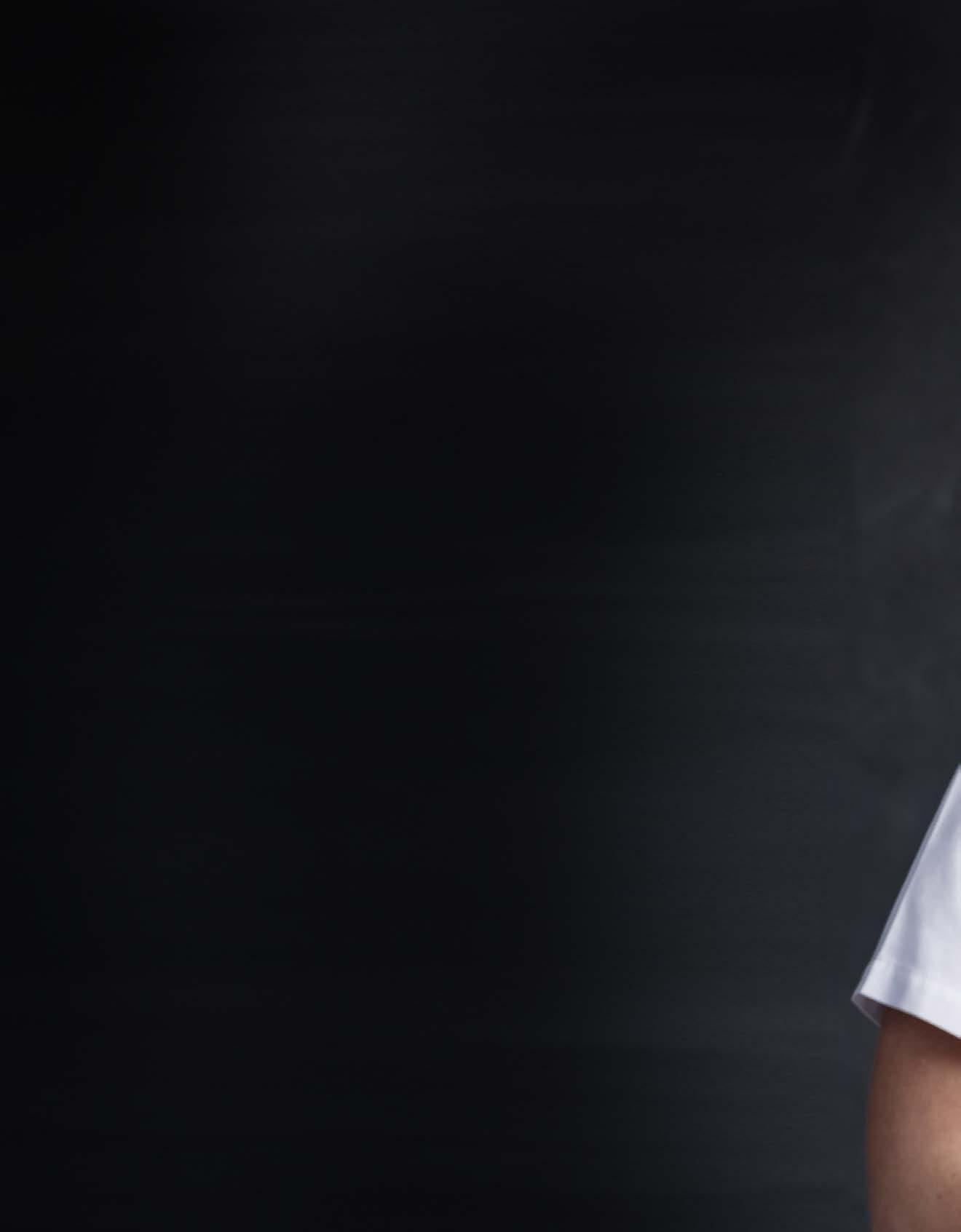
Fergie Ferguson is an Army ROTC scholar and a captain in the Corps of Cadets, where she leads the International Platoon. At Norwich, she has played varsity rugby and served as vice president of the Criminal Justice Student Association, a master physical trainer of Unifty, a physical training instructor for the Ranger Challenge, a member of the Pre-Law Society, a volunteer liaison for Rotaract, and as a Civic Scholar with Center for Civic Engagement.
Interviews condensed and edited for length and clarity.



